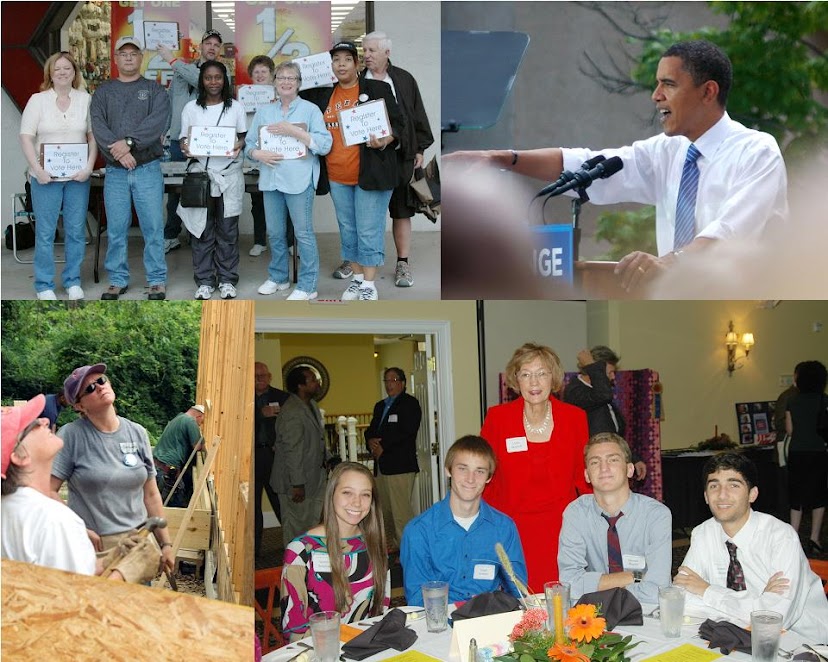I don't know how many people in this country have convinced themselves that Obama is some Hitler/Stalin/Imam incarnate whose mission is to overthrow the Constitution and install a fascio/marxist/Islamic theocracy.
But based on the e-mails I receive and on the listener ratings of media alarmists, there seem to be a disturbing number.
The latest to cross my laptop is a "wakeup call "from a person identifying himself as Cmdr. Jerry Wilson, a naval aviator, that is now a favorite read in the far-right blogosphere.
We are, according to Wilson, "in the middle of a communist revolution" and on the verge of a "takeover of the energy industry" and a gerrymandering of electoral districts to create one-party rule that will "create crisis after crisis" as an excuse to "nationalize the means of production."
Consequently, "out of desperation at the thought of losing America," groups are forming to shut down government's supposedly blatant abuse of the Constitution. "I won't start the fight," Wilson says, "but when it goes down, I will join it."
In a world suffused with uncertainty, how can individuals evince such certitude in their biases? Every aspect of our existence is marked by doubt. There are myriad frames of reference -- nations, languages, religions -- each understandable within their own political, economic and cultural milieu.
On a world scale, it would take unsurpassed hubris to assert that only one's own frame of reference was "right." Of the major religions (2.1 billion Christians, 1.5 billion Islamists, 900 million Hindus, 400 million Chinese traditionalists, 400 million Buddhists and more than 1 billion secularists), only after death can one know which, if any, were "right." Professions of faith can be understood, but not certainty.
 Given the uncertainty that permeates other aspects of existence, how can one explain the certainty of the extreme political views being expressed in this country? Every issue confronting us is shrouded by doubt, be it poverty, health, energy, immigration, terrorism, education, the economy, Iraq, Afghanistan, ad infinitum. There are neither obvious nor easy answers to any on the list.
Given the uncertainty that permeates other aspects of existence, how can one explain the certainty of the extreme political views being expressed in this country? Every issue confronting us is shrouded by doubt, be it poverty, health, energy, immigration, terrorism, education, the economy, Iraq, Afghanistan, ad infinitum. There are neither obvious nor easy answers to any on the list. While the contesting and ultimate reconciliation of strongly held views are the essence of the decision process in a democratic society, that process is not enhanced by views overwhelmed by certitude and/or put forward with a vitriol that peaks with threats of force.
It is time to return reason to a place of prominence. The current president was duly elected, meeting all constitutional requirements including an oath to support the Constitution. The policies and programs he proposed to pursue were clearly enunciated prior to his election and implicitly endorsed by a majority of the citizenry.
There are and will continue to be grounds for reasonable people to oppose the manner in which he is executing his duties -- and he is fair game for criticism on all matters of substance.
But it is time to move away from frivolities such as his place of birth or ill-founded claims of unconstitutional appointments of so-called "czars." Of greater concern is the movement from frivolity to irrationality evidenced by the gathering of protesters waving signs inexplicably portraying Obama on the one hand as Hitler, and on the other as a Marxist, accompanied by shouts of, "We want our country back."
The protesters did not lose their country, they lost an election. If their alleged love for the Constitution and fears of a dictatorial coup were not feigned, they would turn their energies from tirades to the development of ideas holding some promise of success in the next election.
The gun-wavers and "militia men" involved, such as Wilson, hint darkly that their love for the Constitution is such that they may not be willing to wait until the next election to revolt and take up their arms -- an act clearly violating the document they supposedly cherish! While the First Amend-ment may protect such speech, it should not be spared severe censure for its impropriety.
It defies understanding how otherwise responsible politicians and publications, presumably concerned with the maintenance of a civil society, can continue to tolerate, and by implication condone, such threats. It is they who should be leading protests.
We live in a world of doubt, and we should each strive to live with that doubt in a responsible manner and be willing to call to account those who do not.
No president is infallible; no solution is perfect; and the political process should not be expected to yield more than what is approximately the "good" -- the best result possible from the compromise of divergent views.
J. Thomas Tidd is a retired attorney living in Pinehurst.

No comments:
Post a Comment